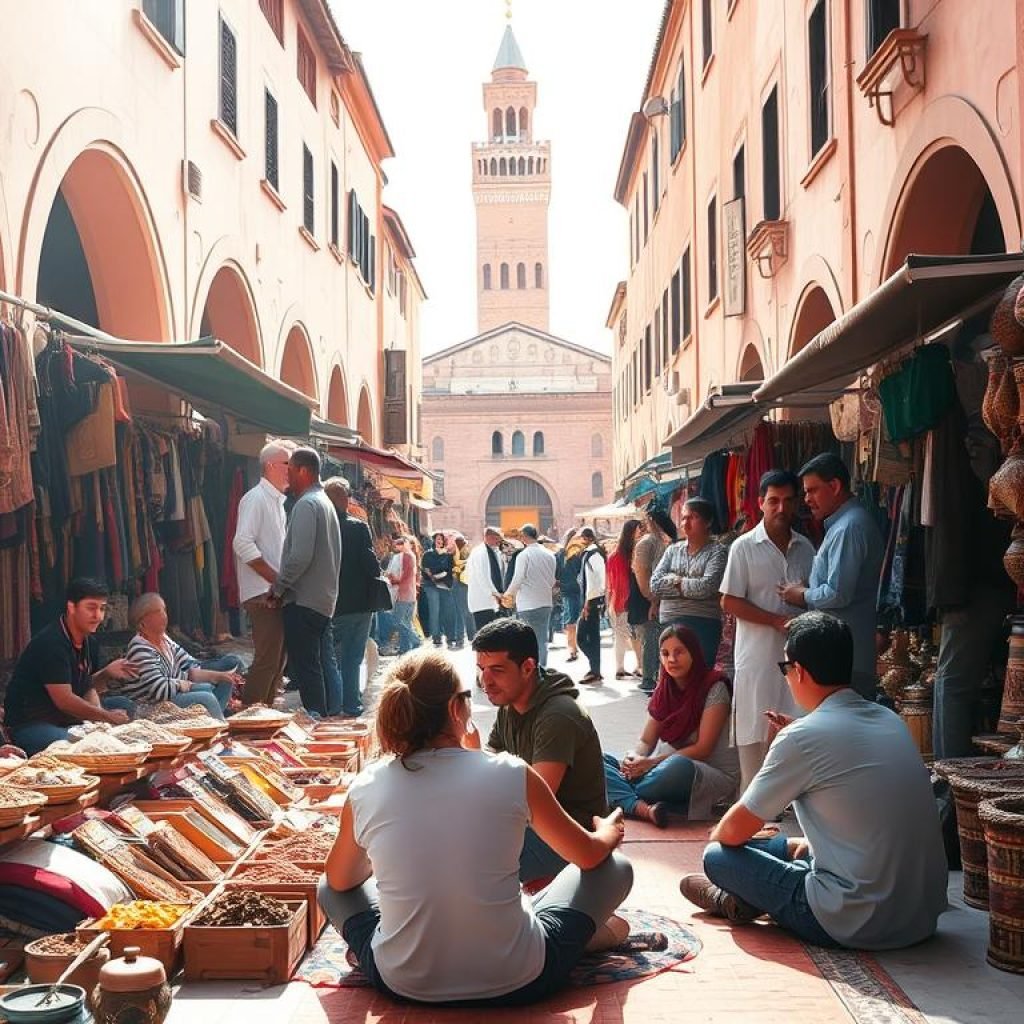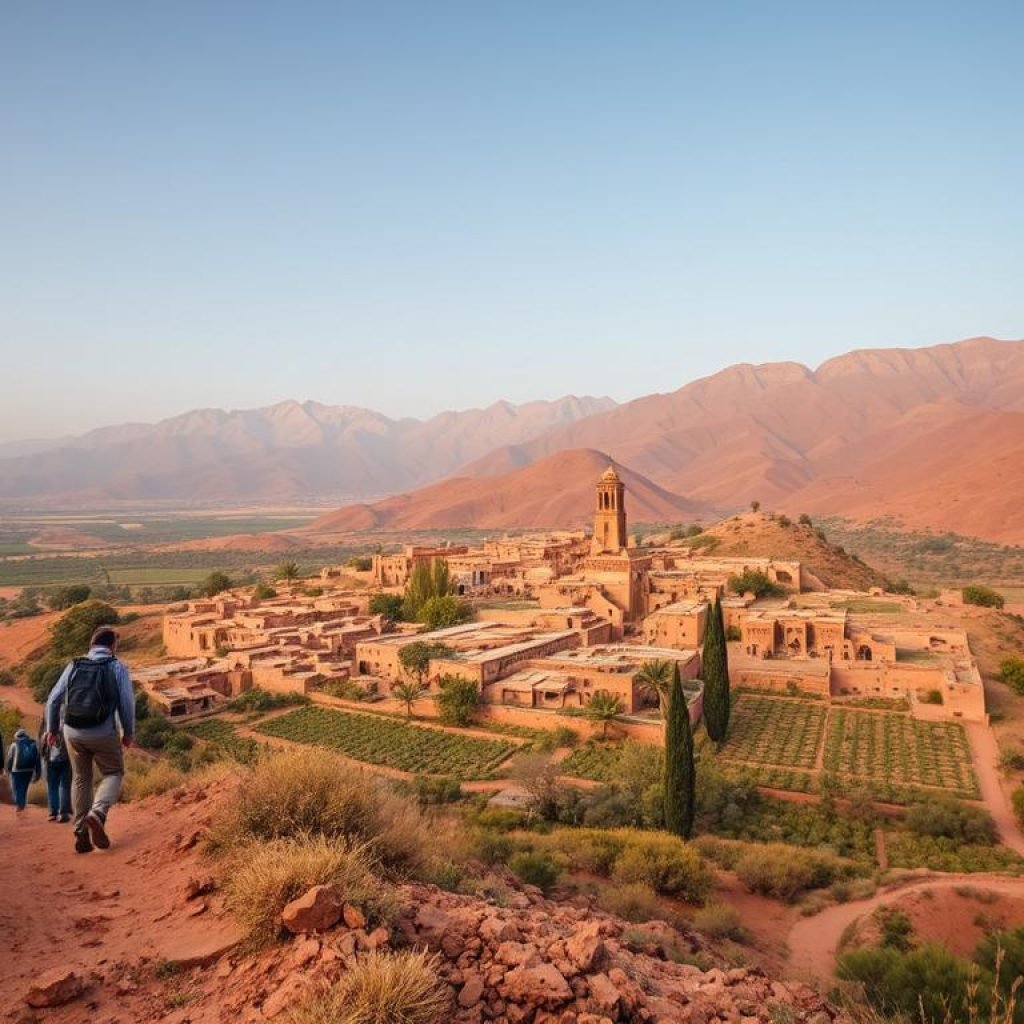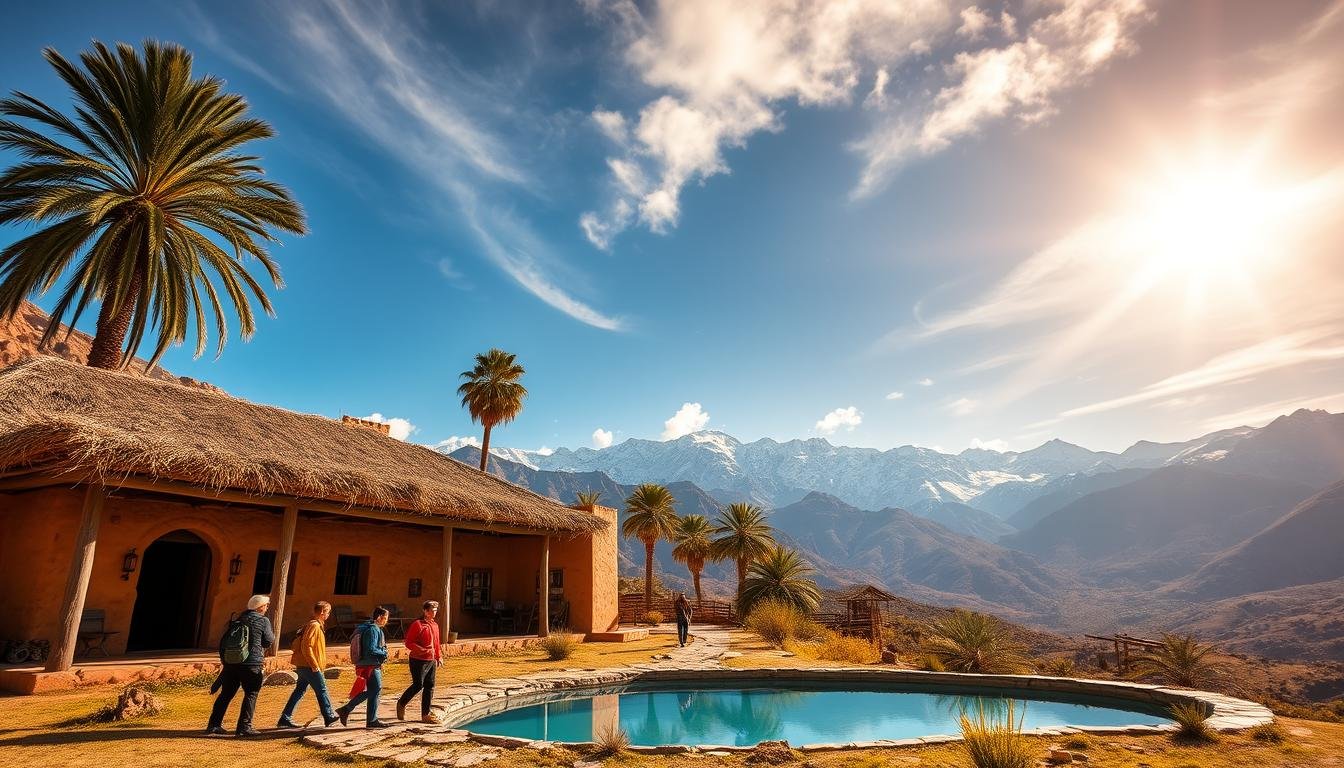Have you ever stood at the edge of a vast desert or gazed at the towering peaks of the High Atlas mountains and felt a deep connection to the world around you? Morocco offers these breathtaking moments and more, but it’s up to us to ensure these treasures remain for generations to come. Sustainable tourism isn’t just a trend—it’s a responsibility.
By making thoughtful choices, like supporting local businesses or opting for low-impact activities, you can help preserve Morocco’s natural beauty and cultural heritage. From exploring the vibrant souks to hiking in the Atlas Mountains, every step you take can make a difference. This guide will show you how to enjoy an unforgettable experience while leaving a positive impact.
Key Takeaways
- Support local businesses to boost the economy and preserve traditions.
- Choose eco-conscious accommodations that use renewable energy.
- Opt for sustainable transport options like trains or walking tours.
- Reduce waste by using reusable products during your trip.
- Engage in community-based activities to connect with local culture.
Understanding Eco-friendly Travel Morocco Principles
Exploring the principles of sustainable tourism can transform how we experience new destinations. In Morocco, this means making choices that protect its natural beauty and cultural heritage. From the bustling souks to the serene desert landscapes, every decision matters.
Defining Sustainable Travel in Morocco
Sustainable tourism in Morocco focuses on minimizing environmental impact while supporting local communities. This includes staying in eco-conscious accommodations that use renewable energy and reduce waste. Many hotels and guesthouses reinvest in local projects, ensuring that tourism benefits everyone.
Choosing guided tours led by local experts is another way to practice responsible tourism. These tours often emphasize lower carbon emissions and waste reduction. For example, desert treks and camel rides are designed to have minimal impact on the environment.
Environmental and Community Impact
Respect for local traditions and customs is a cornerstone of sustainable travel. By engaging with communities and supporting their traditions, travelers can create meaningful connections. This not only enriches the experience but also helps preserve cultural heritage.
Eco-friendly tours and activities, such as sandboarding or hiking in the Atlas Mountains, promote nature conservation. These activities are designed to protect the environment while offering unforgettable experiences. Supporting such initiatives ensures that Morocco’s natural wonders remain intact for future generations.
| Practice | Impact |
|---|---|
| Staying in eco-conscious hotels | Reduces energy and water consumption |
| Choosing local-guided tours | Supports community livelihoods |
| Engaging in desert treks | Minimizes environmental footprint |
By making thoughtful choices, travelers can leave a positive mark on the places they visit. Sustainable tourism is not just about seeing the world—it’s about preserving it for others to enjoy.
Local Community and Cultural Engagement
Connecting with local communities is one of the most rewarding aspects of exploring a new destination. It’s not just about seeing the sights—it’s about understanding the people and traditions that make a place unique. By engaging respectfully, you can create meaningful experiences while supporting the local way of life.
Cultural Respect and Local Interactions
Respect is the foundation of any cultural exchange. Always ask permission before photographing a person or their property. This simple act shows consideration for their privacy and traditions. Engaging with locals in a respectful manner opens doors to authentic experiences.
For example, taking a cooking class in Marrakech allows you to learn traditional recipes while supporting local chefs. These interactions enrich your journey and provide insight into the country’s vibrant culture.

Supporting Local Artisans and Businesses
When you buy directly from local artisans, you help preserve their craft and traditions. Markets in Marrakech and other cities are filled with handmade goods, from pottery to textiles. Purchasing these items supports families and keeps cultural heritage alive.
Local businesses also benefit from your patronage. Staying in family-run guesthouses or dining at small restaurants ensures your money stays within the community. This approach fosters economic growth and sustainability.
Community-Based Tourism Initiatives
Community-based tourism offers a deeper connection to the places you visit. For instance, interacting with Berber communities in the High Atlas mountains provides a glimpse into their traditional way of life. Local guides share stories and insights that you won’t find in guidebooks.
These initiatives not only benefit visitors but also empower residents. By participating, you contribute to projects that improve education, healthcare, and infrastructure. It’s a win-win for everyone involved.
For those seeking an adventure, consider combining a desert tour with a visit to the Atlas. This experience highlights the beauty of the environment while supporting local guides and communities.
Sustainable Accommodations and Eco-Tours
Choosing the right place to stay can make a world of difference in your journey. From boutique riads to eco-lodges, Morocco offers a variety of options that prioritize sustainability. These accommodations not only reduce environmental impact but also enhance your connection to the local culture.
Eco-friendly Lodging Options
Many hotels and guesthouses in Morocco are leading the way in sustainable practices. For example, Les Jardins de la Medina in Marrakech uses renewable energy and water-saving systems. Similarly, Ouirgane Ecolodge in the Atlas Mountains focuses on intelligent irrigation and local sourcing.
These accommodations often incorporate energy-saving technologies and reduce waste. For instance, Paradis Plage Surf Yoga & Spa Resort near Agadir has been recognized for its commitment to local sourcing and eco-certification. Staying at such places ensures your visit supports the community and the environment.
- Boutique riads in Marrakech use traditional designs and eco-friendly materials.
- Eco-lodges in the Atlas Mountains promote water conservation and renewable energy.
- Resorts near Agadir focus on local produce and sustainable tourism projects.
By choosing these options, you contribute to a high standard of environmental responsibility. They serve as models for the hospitality sector, showing how tourism can benefit both the destination and its people.
These accommodations also offer a deeper connection to the local culture. Whether it’s a riad in the heart of the city or a lodge in the mountains, each stay is designed to immerse you in the world of Moroccan traditions. This approach ensures your journey leaves a positive impact.
Adventure and Environment: Sustainable Activities in Morocco
Adventure seekers can find a unique blend of thrill and responsibility in Morocco’s stunning landscapes. From golden deserts to towering mountains, the country offers activities that combine excitement with a commitment to conservation. By choosing sustainable options, you can enjoy these experiences while supporting local communities and preserving natural beauty.

Desert Treks and Camel Journeys
Exploring Morocco’s deserts is a once-in-a-lifetime experience. Camel treks in the Agafay Desert or the Sahara allow you to immerse yourself in the serene beauty of these landscapes. Local guides lead these journeys, ensuring minimal environmental impact while sharing insights into Berber customs and traditions.
Sandboarding and desert camping are other popular activities. These adventures are designed to respect the fragile desert ecosystem. By hiring local guides, you not only enhance safety but also contribute to the livelihoods of desert communities.
Hiking in the High Atlas and Nature Trails
The High Atlas Mountains are a paradise for hikers. Trails like those in Toubkal National Park are carefully maintained to protect the environment. Guided hikes often follow Leave No Trace principles, ensuring that the natural beauty remains untouched.
These hikes offer more than just physical challenges. They provide opportunities to connect with Berber culture and learn about traditional ways of life. Local guides enrich the experience with stories and knowledge, making each step a cultural journey.
Whether you’re trekking through deserts or mountains, these activities benefit both travelers and local communities. They promote conservation and support sustainable tourism practices. For more details on eco-conscious adventures, visit Morocco Green Tours.
Practical Sustainable Practices While Traveling
Making small changes during your trip can have a big impact on the environment. By adopting mindful habits, you can reduce your carbon footprint and support local communities. Here are some actionable steps to make your journey more sustainable.
Tips for Reducing Your Carbon Footprint
Start by packing light. This reduces fuel consumption during transportation. Carry a reusable water bottle to avoid single-use plastics. Many places in Morocco, including the Sahara Desert, have refill stations to support this practice.
Choose local transportation options like trains or shared taxis. These methods are not only cost-effective but also reduce emissions. For longer distances, consider eco-certified tour operators who prioritize sustainability.
When booking tours, opt for smaller groups. This minimizes environmental impact and allows for a more personalized experience. For example, guided hikes in the High Atlas often follow Leave No Trace principles.
Integrating Renewable Energy and Local Traditions
Stay in accommodations that use renewable energy. Many riads and eco-lodges in Morocco have adopted solar power and water-saving systems. These practices ensure your stay supports the environment.
Respect local traditions when visiting sensitive areas like the Sahara Desert. Avoid littering and follow guidelines set by local guides. This way, you help preserve the natural beauty of the place.
Support local artisans by purchasing handmade goods. This not only boosts the economy but also keeps cultural heritage alive. For more insights on sustainable tourism, visit Morocco Travel.
| Practice | Impact |
|---|---|
| Using reusable water bottles | Reduces plastic waste |
| Choosing local transportation | Lowers carbon emissions |
| Staying in eco-lodges | Supports renewable energy |
Conclusion
Every journey leaves a mark, but it’s up to us to ensure it’s a positive one. By embracing responsible travel, you can protect the unique environments of the High Atlas Mountain and beyond. Supporting the local community, staying in eco-conscious accommodations, and engaging in sustainable activities like hiking in Toubkal all contribute to a brighter future.
Morocco’s focus on renewable energy and conservation sets an example for the world. From solar-powered lodges to community-based tourism, every effort counts. Your choices—whether it’s a family trip or an adventure—can make a lasting impact.
Plan your next trip with sustainability in mind. By integrating local traditions and supporting eco-tourism, you not only enrich your experience but also help preserve these treasures for generations to come. Let’s make every journey meaningful.




Comment (0)